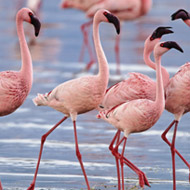
Researchers present methods for flexible post-mortem examination of flamingos
In a paper published this month in Ostrich: Journal of African Ornithology, researchers have presented tried and tested protocols for the post-mortem examination of flamingos, so that they will be better prepared in the event of future die-offs.
The lakes of Kenya's Rift Valley boast spectacular pink aggression of lesser and greater flamingos. Over the last 20 years these populations have suffered a series of unexplained mass mortality events, during which thousands of birds die over a period of just a few months. Not only is this distressing to witness, but it is also a serious concern for conservationists.
The Rift Valley lakes represent the largest of four populations of this species of flamingo worldwide, consisting of around 1.5-2.5 million birds. Because only a handful of salt lakes support this huge population, these mysterious dies-offs have the potential to threaten the global health of the species. Suggested causes range from infectious diseases such as avian cholera, to poisoning by toxins, insecticides or heavy metals. This variety means that studies have been undertaken by researchers from many different disciplines, each using different approaches. The result has been samples that cannot easily be compared with each other, and no consensus on the underlying cause.
The strength of the easy-to-follow protocols listed in the paper lies in their flexibility, which allows them to be adjusted according to the available labour and number of dead birds. When there are many birds and few staff, the "super-fast track" form ensures that the most essential data and vital samples will be prioritised; when there are fewer birds and more people, instructions for a comprehensive examination can be followed.
Co-author, Professor John Cooper said: “We believe that collecting standardised samples and measurements will be the key to finally finding the cause of these highly concerning events, and ultimately being able to prevent future die-offs and protect this globally important population.”
Article published in“Post-mortem examination and sampling of African flamingos (Phoenicopteridae) under field conditions”, by John E Cooper, Amy E Deacon & Thomas Nyariki, Ostrich: Journal of African Ornithology.



 The Veterinary Medicines Directorate (VMD) is inviting applications from veterinary students to attend a one-week extramural studies (EMS) placement in July 2026.
The Veterinary Medicines Directorate (VMD) is inviting applications from veterinary students to attend a one-week extramural studies (EMS) placement in July 2026.